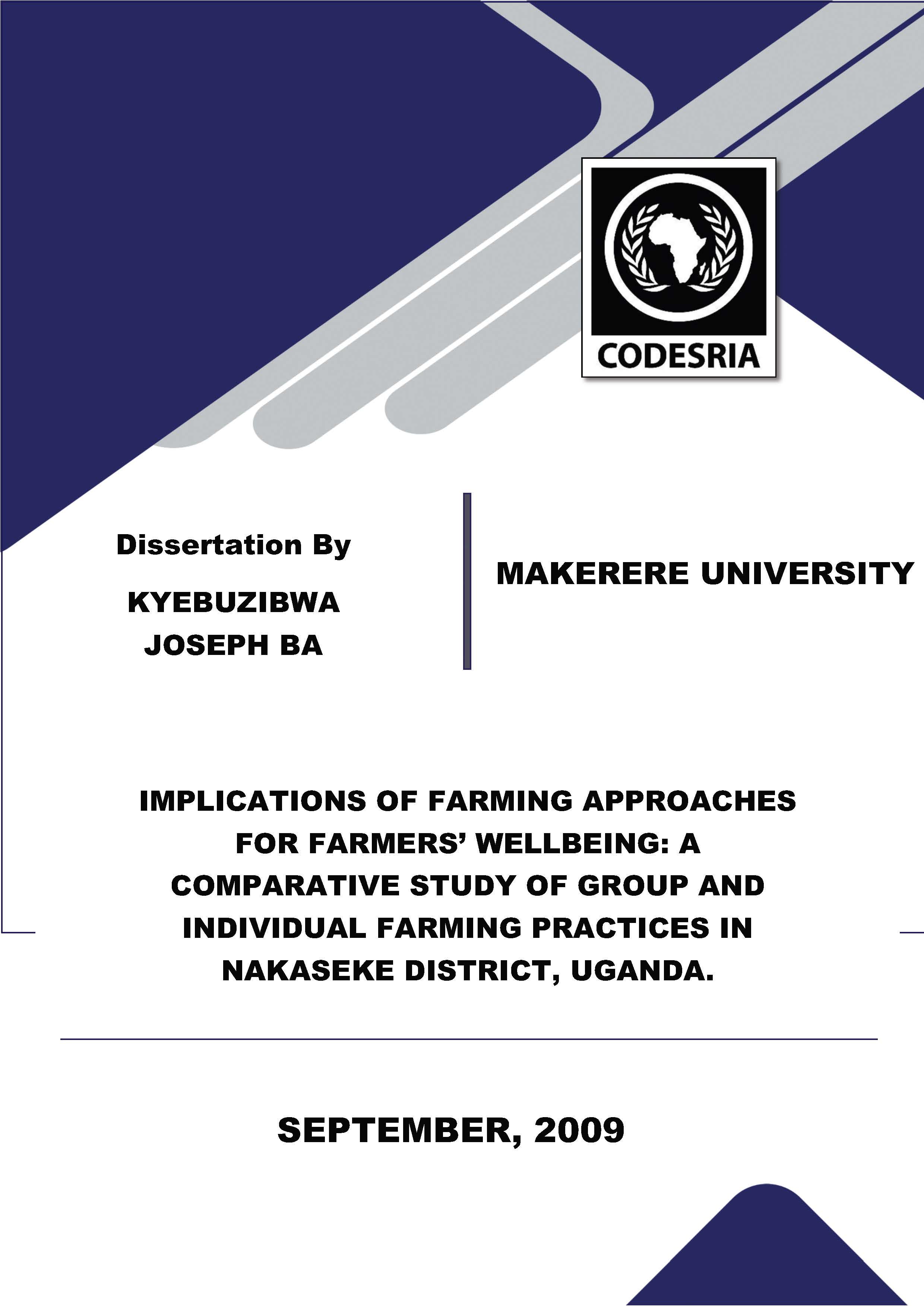IMPLICATIONS OF FARMING APPROACHES FOR FARMERS’ WELLBEING: A COMPARATIVE STUDY OF GROUP AND INDIVIDUAL FARMING PRACTICES IN NAKASEKE DISTRICT, UGANDA.
Keywords:
INDIVIDUAL FARMING, UGANDASynopsis
The emphasis on Farmer Groups (FGs) is to develop a demand driven and farmer led Agricultural Advisory Services (AAS) delivery mechanism that is responsive to the challenges of ‘poor’ farmers who cannot absorb the costs of individual participation. In Uganda, the National Agricultural Advisory Services (NAADS) was started and as such, is meant to transform and empower farmers through their groups to gain access to and have control over Agricultural Extension Services (AES). However, the disincentives inherent in group approaches have continued to render the approach ineffective. There are farmers who have continuously avoided farmer groups in spite of the fact that the approach is believed to lower the delivery and purchasing costs of AES. The study assessed formation dynamics of FGs, perceptions of farmers about the two approaches as
well as the motivations and constraints inherent in each approach and lastly the benefits that accrue to farmers from participating as groups or individuals. The study was conducted in Nakaseke district and used a case study of FGs under the NAADS programme; in addition, it used the descriptive survey methods (semi-structured questionnaire and interview guides) in collecting data. There were some initial misunderstandings by farmers about NAADS. Farmers expected to get free farm inputs
which led to formation of false groups. Group formation largely depended on friendship and family ties, gender and level of farming resources and men controlled group activities. The very poor and the rich were absent in group activities. Notably from the research findings, NAADS is not addressing the pride of the resource poor farmers with no farm resources and are excluded from participating in farmer groups. The implementation of NAADS has concentrated more on theoretical training than producing tangible commercial farm outputs that would empower farmers financially and encourage their participation and ownership of the programme. It is therefore necessary for NAADS and other development partners harmonize the programme to include the resource poor farmers and bring them into programme activities. NAADS should empower farmer groups either by strengthening farmer grass root farmer institutions so that government and donor funding flows directly to these groups and should as much as possible encourage farmers to raise own funds to supplement government or donor funds.
Downloads
References
Anderson. J. and Feder G (2003). Rural Extension Services. Policy Research Working Paper 2676. Washington, DC: World Bank.
Barr. N and Carey. J. (2000). Influencing Improved Natural Resource Management on Farms. Canberra: Bureau of Rural Sciences
Belshaw Deryke (2002). “Presidential address strategizing poverty reduction in Sub-Saharan Africa: the role of small-scale agriculture” in Journal of Agricultural Economics,Volume 53 No2
Byron. I, Curtis. A and MacKay. J (2004). Providing Social Data to Underpin Catchment Planning in the Queensland Murray-Darling Region. Canberra: Bureau of Rural Sciences
Cary. J, Webb T and Barr N (2002). Understanding Land Managers’ Capacity to Change Sustainable Practices: Insights about Practice Adoption and Social Capacity for Change.Canberra: BRS
Chambers. R. (1997). Whose reality counts? : putting the first last. Intermediate Technology Publications Ltd, London (United Kingdom)
CIAT (2003). Farmer Research Group Dynamics in East Africa: The Highlights Series from Research Results and Policy Implications from the work of CIAT and its Partners in Africa. Website: http://www.ciat.cgiar.org Community Development Network (2002). Find the Ground and You have Found the Poor: Exploring the Dynamics of Community Development Organizations in Arua and
Kabale. Kampala Uganda: CARE International-Uganda
DENIVA (2005). Assessment of Effectiveness of Farmer Groups as Viable Institutions for Farmer Empowerment and Poverty Reduction in the Implementation of PMA. Kampala-Uganda.
Engindeniz. S and Yercan M (2002). An Approach for Turkish Agriculture: Group Farming. The University of Ege, Faculty of Agriculture, Department of Agricultural Economics.






